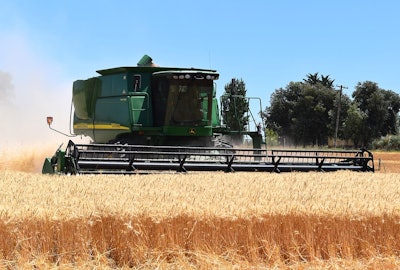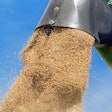
Part of my job at a country elevator was buying grain from farmers. I want to be completely clear that the vast majority of my interactions were positive. Sure, some relationships were stronger than others, but in general, I liked and enjoyed working with my farmer customers and celebrated their successes.
I could tell numerous stories about positive customer interactions. Most resulted in mutual benefit for the farmer and elevator, but I recently recalled an experience with a farmer that left me disappointed while teaching me a valuable lesson. Midway through harvest, he had delivered all his contracted soybeans and was facing the reality of selling his remaining beans at a much lower price than his forward contracts. He sent me an email noting that the river terminal (run by a large multinational corporation), while further away, was paying about 20¢ better than I was for beans and how even with more trucking costs, he would end up with a higher net price selling to them. He wondered how he could turn down the extra money to do business with us.
I sent off a masterpiece of a response explaining why people do business with their local elevator. I explained that working with us may mean sacrificing a few cents per bushel to receive superior service and support. I pointed out that we had worked with him since he bought his inputs to proactively market grain with targets above his break-even. I pointed out that we had assisted him in getting his harvest done to that point in a timely and efficient manner with long receiving hours, picking up grain at his farm late and on weekends and even parking trucks overnight for him to fill. I pointed out that the terminals that pay more tend to have a longer wait time to get dumped and that people work with country elevators like us to avoid those kinds of headaches and get more done in a day. I went on to remind him that we were a small local business that was active in the community supporting local charitable functions and county fair livestock auctions, and we did all this without the backing of a large parent corporation. We couldn’t do all these things and match terminal prices penny for penny. I had never put these thoughts into writing, and it felt great. I was confident that anyone who read it would want to do all their business with me enthusiastically.
The next day he sold the rest of his soybeans to the river terminal.
I felt deflated and wondered if I had made a mistake in my approach. I knew the customer was comparing price, so why did I bother to focus on service instead of just offering to pay more (whether profitable or not) to keep the bushels coming my way and save my pride? I shared my story with one of our feed salesmen, and he said something that hit home for me, “I learned early on that I cannot be all things for all my customers.” I started to look at buying grain differently. I had to accept that I wouldn’t, and for that matter
couldn’t handle every bushel. My efforts were always going to be better spent building stronger relationships with my customers and offering sound marketing advice and superior service than chasing bushels by overpaying for them.
I’m not sure how much more I would have had to pay to buy those beans that day, but what I do know is that I had set our bid competitively with our local market with anticipation of turning a profit. I won’t say I never paid a penny or two more than my posted bid for some grain, but elevator margins can be slim, and price matching to win business is a slippery slope. It implies that bids are something other than a reflection of what the elevator can pay for grain and make an acceptable margin.
Stop trying to buy every bushel and start focusing on these two ideas.
Buy smart
“Do whatever it takes” sounds like a great business philosophy, but it is crucial to define your goal before adopting such a strategy. It is easy in the grain industry (and many others) to equate a higher volume with success. However, doing whatever it takes to buy more bushels is not always a recipe for profitability.
Avoid competing for bushels on price alone and chasing bushels at any cost. Anyone who has set bids for an elevator knows what typically happens when they raise their bid above competitors. The competitors raise their bids, as well. I’m not implying that an elevator should never raise their bid, but if a company plans to set themselves apart with price alone, everyone will know how to beat them.
Another pitfall to avoid is compromising on the elevator’s grain buying policies. Lowering fees (storage, Price Later, etc.) or allowing people to use space for free at times when the elevator should be capitalizing on it (i.e., harvest) is more likely to cut into profitability than to earn future business that will be profitable. Set policies that are competitive in the local market but reflects real value and the actual costs of operating the business.
It’s hard to merchandise a way out of poor buying decisions or policies.
Focus on relationships
The advice above is not suggesting that an elevator should not try to buy more bushels or grow the business. I recommend, however, focusing on building strong customer relationships. Stay in touch with customers year-round. Go out and see them. Strive to help them make their operation profitable and become a trusted partner in their marketing.
Stress proactive marketing. A lot of grain is sold in the nearby or spot market. However, focusing on contracting grain ahead, particularly before harvest, not only tends to give the farmer a better price but can also set you apart from other buyers. It is challenging to set yourself apart in the harvest spot market when decisions often come down to a few cents difference in bids or drying rate or .5% difference in shrink rate. Ahead of the harvest is when discussions on cash flow, profitability, and logistics can occur. These discussions are more enjoyable and productive.
A strong relationship won’t get every bushel but will help build loyalty and lead to buying more bushels profitably.
An elevator can’t be all things for all people and won’t handle all the bushels, so focus on buying smart and building relationships. ■
Tracy Henkel is a grain merchandising specialist with White Commercial Corp. He helps grain elevators across North America maximize their merchandising opportunities and strengthen their relationship with producers through profit-based grain origination. He can be reached at [email protected] or follow him on twitter @thenkelWCC.


















